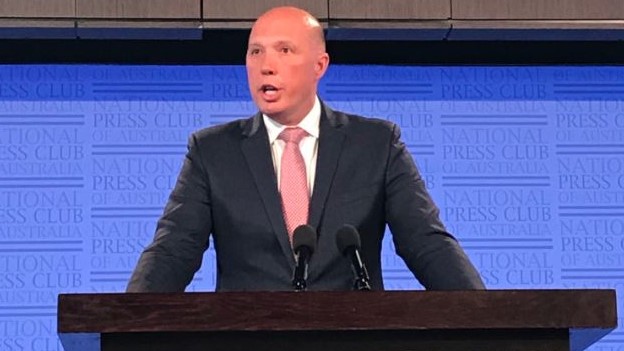Minister for Home Affairs Peter Dutton has called on “multi-billion-dollar Silicon Valley companies” to relax their stance against the government’s proposed encryption bill.
“Now there are vocal opponents to this legislation,” he told the National Press Club in Canberra on Wednesday.
“The same companies that need to be hounded to pay tax in Australia and other jurisdictions, and the same companies who have misused personal data to commercial advantage.
“And it should be noted, these are the same companies who protest about having to help police with the encryption problem, whilst operating their businesses in less democratic countries and accepting at the same time a compromise on privacy to allow their presence in those growth markets.”
Dutton was referring to the response to the proposed bill from the Digital Industry Group Incorporated – the industry association representing the likes of Facebook, Google and Twitter in Australia – which expressed concern, saying “these requirements have potential to erode consumer trust and introduce weaknesses that malicious actors could exploit.”
The Assistance and Access Bill 2018 currently sits before a parliamentary committee for inquiry and report.
Concerns around the proposed regulation have mainly surrounded the idea of a ‘backdoor’ being required of tech companies.
And while the bill’s explanatory document does state that designated communications providers will be required to “build a new capability that will enable them to give assistance as specified in the legislation to ASIO and interception agencies,” Dutton denied such requirements can be classified as a backdoor.
“The legislation does not permit so-called ‘backdoors’ – there will be no weakening of encryption,” he maintained.
“In fact, the bill specifically provides that companies cannot be required to create systemic weaknesses in their encrypted products, or be required to build a decryption capability and robust measures will ensure individual privacy is protected and cyber security safeguarded.”
Dutton and the Department of Home Affairs recently absorbed responsibility for cyber security following the government's most recent cabinet reshuffle.
Bipartisan support required
In discussing the necessity of the bill, Dutton called on the Opposition to lend a hand in getting it through parliament.
“It is an essential piece of legislation and it can only succeed if it’s supported in the Senate by the Labor Party. We want bipartisan support for key national security bills,” he said.
“[Opposition Leader] Mr Shorten needs to exert his authority and support the bill. The decision for Mr Shorten is whether he supports the Silicon Valley multi-billion-dollar companies or whether he’s on the side of protecting Australians.”
Earlier this week, Shadow Minister for Communications Michelle Rowland delivered an address on the topic, echoing Dutton’s call for bipartisan support.
“Protecting national security and enabling law enforcement agencies to operate effectively in the digital age is a bipartisan commitment,” she said.
However, she also appeared to take issue with the proposal of communications providers modifying security capabilities.
“The proposed assistance framework does appear to go beyond encryption and potentially into the sphere of modifying devices and software at different points in the service stack,” she said.
“This, to the best of my knowledge, is new territory and therefore needs to be scrutinised rigorously.”










